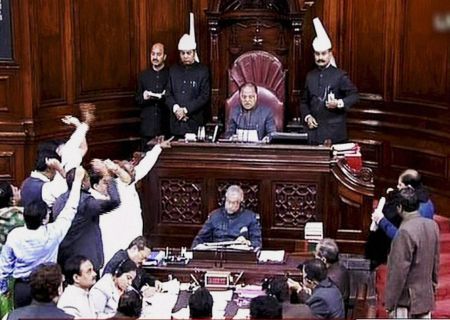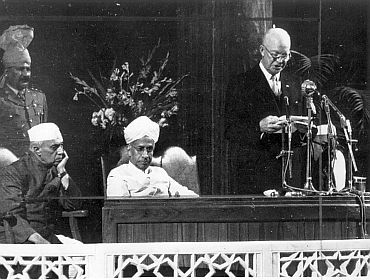'One wonders if he has decided on the disastrous course of taking after Manmohan Singh, sitting like a Madam Tussaud wax figure, the same expressionless face, eyes unblinkingly staring in front, and making absolutely no difference, and no contribution, to the House proceedings,' asks B S Raghavan.
 The logjam in the Rajya Sabha over the issue of re-conversion of Muslims into Hinduism was entirely of Narendra Modi's making.
The logjam in the Rajya Sabha over the issue of re-conversion of Muslims into Hinduism was entirely of Narendra Modi's making.
Yessir, I repeat it: Narendra Modi's making, not the BJP's because the BJP is no more than the reflection of Modi's persona and echo of his voice.
Not that of the Congress, or any of the parties in the Opposition in the Rajya Sabha, because what they are doing is precisely what is expected of them, especially when they have an opportunity to pay the BJP back in its own coin.
Right from the time he was proclaimed to be the BJP's prime ministerial candidate a year ago, Modi had formulated in his own mind a clear vision of his and the party's goals, and to that end, had conceived of the plot, written the script and directed the play.
In short, Modi is the pre-eminent strategist of his party, the promoter of its prospects and shaper of its destiny.
In short, he is the mover and shaker, moulder and maker, the mascot and the talisman, of the party.
Take away Modi, and we are left with a ragtag bunch of clueless babes in the wood.
Is Modi losing his touch?
Watching him these days, one wonders whether he has decided on the disastrous course of taking after Manmohan Singh, sitting like a Madam Tussaud wax figure, the same expressionless face, eyes unblinkingly staring in front, and making absolutely no difference, and no contribution, to the quality and substance of the House proceedings.
Here was an issue -- religious conversion -- which was a god-send to the BJP, and, indeed, to all those who abhor any kind of forcible conversion.
The Supreme Court, in Reverend Stainislaus v State of Madhya Pradesh (AIR 1977 SC 908, 911) had already firmly declared that the right to propagate religion conferred in Article 25 of the Constitution does not grant the right to convert another person to one's own religion, and any deliberate effort to do so would impinge on the freedom of conscience guaranteed to all citizens.
If only Modi, the moment the so-called secular parties in the Rajya Sabha demanded the clarification of the government's position, stood up and said that he too was against forcible conversions and asked the secular parties point-blank to affirm their support to a strong legislation against forcible conversions of any kind, he would have called their bluff, for all the world to see, then and there.
He would have applied the quietus to the synthetic controversy whipped up by the Opposition and helped the House proceed with its regular business.
Instead, he left the task to second and third rankers in the BJP and in the process, invited on the government and inflicted on the nation, the ugly and costly ruckus that held up proceedings for so many days.
I would earnestly urge Modi to make a deep study of Jawaharlal Nehru's management of Parliament, which I have watched from close quarters. He was his own Parliamentary Affairs minister and except on days when he was out of Delhi, arrived in either of the Houses a few minutes before the starting time every day, regardless of whether or not anything was put down in his name in the day's business.
He was in his seat ahead of the presiding officer, after exchanging pleasantries with those present and made it a point to stand up and bow to the presiding officer when he was announced and took his seat.
 He intently followed the question hour and all discussions on matters relating to ministries and very often made impromptu interventions by way of supplementing his ministers' answers to question or replies to debates.
He intently followed the question hour and all discussions on matters relating to ministries and very often made impromptu interventions by way of supplementing his ministers' answers to question or replies to debates.
In my four years of avidly watching him in both Houses of Parliament, I do not recall a single occasion when he refused to part with any information asked for by members or avoided a debate on the pretext of some rule, public interest or confidentiality.
Indeed, he was openness and transparency personified: He could not be anything else having been an ardent disciple of Mahatma Gandhi for three decades.
When Dr Ram Manohar Lohia brought an absurd charge of the municipal tax on Nehru's house 'Anand Bhavan' in Allahabad being based on under-valuation, impliedly because of arm-twisting by some Congress busybody, Nehru submitted before Parliament the enire documentation on which the valuation was based.
Nehru never ever had stage fright in facing Parliament and always looked upon the Opposition as an integral part of governance itself.
Having been under the shadow of Nehru, Lal Bahadur Shastri emulated Nehru to a large extent. His successors, though, lacking the self-confidence and respect for Gandhian values that Nehru and Shastri had, adopted the wiles and guiles of realpolitik and the devious hide-and-seek practices of statecraft.
Modi has it in him to rise above all this and bring back the resplendence of Nehru's dealings with Parliament. All he needs is the will.
Images: Top: Members of the Rajya Sabha demand that the prime minister make a statement and assure the House that religious conversions won't take place.
Photograph: PTI photo
Bottom: Prime Minister Jawaharlal Nehru and Vice-President Dr Sarvepalli Radhakrishnan during US President Dwight 'Ike' Eisenhower's address to Parliament.
MUST READ:











 © 2025
© 2025